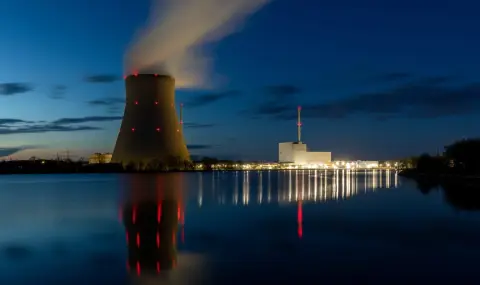Nuclear power does not emit carbon emissions during operation and has been touted as a solution to meet the world's rapidly growing energy needs.
But while it does not pollute the environment in the same way as fossil fuels, nuclear power comes with its own set of environmental problems: among them indirect emissions from uranium mines, contaminated water, radioactive waste and the risk of accidents like the one at Chernobyl.
In recent months, tech giants Meta, Amazon, Microsoft and Google have announced plans to invest in nuclear power, saying that this will help them stick to carbon neutrality - despite their previous commitments to rely solely on renewable energy. And as the clock ticks down on curbing greenhouse gas emissions to halt global warming, some politicians and their financial backers have also come out in favor of a nuclear power revival.
Is nuclear power a realistic climate solution?
Nearly two years after Germany shut down its last nuclear reactors, the conservative CDU/CSU has called for more research into nuclear technology. The party also wants to explore the possibility of restarting nuclear power plants. CDU leader Friedrich Merz has called Germany's withdrawal from nuclear power a "strategic mistake" but said it was unrealistic to restart the last reactors that were shut down.
The far-right Alternative for Germany (AfD) party also insists on a return to nuclear power as part of a “sustainable, serious energy mix“. The coalition, in power until the Bundestag elections on February 23, had ruled out such an option.
Henry Preston, a spokesman for the World Nuclear Association, believes that in recent years politicians have become more “pragmatic”, balancing energy security and the climate emergency, while weighing the increased costs and construction times against the fact that the move could provide “a huge amount” clean energy.
But environmental groups have consistently argued that expensive new nuclear projects, which typically take about a decade to build after all the planning and permitting, will not be brought online quickly enough to help meet climate goals.
“A rapid transition requires the use of existing technologies and solutions that can be deployed as quickly as possible, such as renewable energy sources, primarily solar and wind, energy efficiency and system flexibility,“ said an online fact check by Climate Action Network Europe.
Are small modular reactors a safer alternative?
In the US, some big tech companies are planning to buy power from small modular reactors - advanced nuclear power plants with a capacity of less than 300 megawatts, which is roughly a third of a standard nuclear power plant. plant.
Tech giants have said nuclear power will help power the vast energy needs of AI and data centers while also meeting their climate-neutrality commitments. Today, data centers and AI consume between 1 and 3 percent of the world’s energy supply, a share that some analysts predict will double by 2030.
Supporters of this strategy argue that small reactors will be safer, cheaper and quicker to commission and can be built on the sites of former fossil fuel power plants.
However, the Climate Action Network says these are “empty promises.” Only two such reactor projects have been built worldwide, each with a different Russian and Chinese design. They were brought online in 2019 and 2021, respectively. The report on the state of the global nuclear industry, partly funded by Germany’s environment ministry, said both projects have faced significant construction delays, taking two to three times longer to build than originally planned. They are also over budget and have so far failed to deliver sufficient power output.
The nuclear industry, however, says the delays are not a surprise, as these were pilot projects. Future projects now in the planning stages could “potentially be brought online more quickly,” says Henry Preston. But Michael Schneider, an independent nuclear policy analyst and publisher of the State of the Nuclear Industry report, said that would only be possible if “identical or nearly identical units were replicated,” rather than different designs.
Do we need nuclear power to meet climate goals?
At the 2023 climate summit In Dubai, nuclear power was included for the first time among the low-emission technologies needed to achieve “deep, rapid and sustainable reductions in greenhouse gas emissions“.
The 2022 report of the UN Intergovernmental Panel on Climate Change also mentioned nuclear power, saying that “it is unlikely that all low-carbon energy systems around the world will rely entirely on renewable energy sources“. While acknowledging that wind and solar are expected to play an important role in the drive to replace fossil fuels, energy analysts often speak of the unreliability of renewable energy, which depends on the availability of sun and wind.
Author: Martin Kübler
